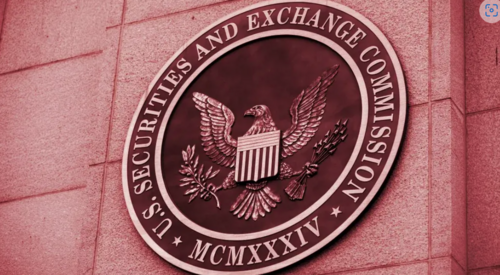
By Jason Nelson

The U.S. Securities and Exchange Commission. Image: Shutterstock.
The SEC today claimed in a new court filing that at least nine digital assets listed on the cryptocurrency exchange Coinbase are unregistered securities.
The nine assets in question are AMP (AMP), Rally (RLY), DerivaDEX (DDX), XYO (XYO), Rari Governance Token (RGT), LCX (LCX), Powerledger (POWR), DFX Finance (DFX), and Kromatika (KROM).
"A digital token or crypto asset is a crypto asset security if it meets the definition of a security, which the Securities Act defines to include ‘investment contract,’ i.e., if it constitutes an investment of money in a common enterprise, with a reasonable expectation of profit derived from the efforts of others," the SEC wrote in a complaint filed today against a former Coinbase employee accused of insider trading.
The SEC and the Department of Justice today announced charges against former Coinbase Product Manager Ishan Wahi and two others, accusing them of running an insider-trading scheme that earned them more than $1.1 million in illicit gains. Wahi allegedly tipped off his brother Nikhil Wahi and his friend, Sameer Ramani, about upcoming token-listing announcements on the crypto exchange.
“Ahead of those announcements, which usually resulted in an increase in the assets’ prices, Nikhil Wahi and Ramani allegedly purchased at least 25 crypto assets, at least nine of which were securities, and then typically sold them shortly after the announcements for a profit,” the SEC said in a press release.
The Commission said that the nine tokens contain the "hallmarks of the definition of a security,” including continuing representations by issuers and their management teams regarding the investment value of the tokens, the managerial efforts that contribute to the tokens' value, and the availability of secondary markets for trading the tokens.
"Thus, at all times relevant to the conduct alleged in this complaint, a reasonable investor in the nine crypto asset securities would continue to look to the efforts of the issuer and its promoters, including their future efforts, to increase the value of their investment," the SEC said.
In a blog post released Thursday, Coinbase said the company had filed a petition with the SEC to improve "rulemaking on digital asset securities."
"Our petition calls on the SEC to develop a workable regulatory framework for digital asset securities guided by formal procedures and a public notice-and-comment process, rather than through arbitrary enforcement or guidance developed behind closed doors," the company said.
Meanwhile, Kromatika Finance, the Ethereum-based DEX aggregator behind the KROM token, responded today to the SEC’s allegations of insider trading at Coinbase and the Commission’s inclusion of the KROM token among its list of unregistered securities on the exchange.
"It has been brought to our attention that our token $Krom is mentioned in a complaint for insider trading," Kromatika tweeted. "This complaint is towards an employee of Coinbase. We, Kromatika Finance, are not involved in this case, nor are our employees."
According to Kromatika, its team was not consulted by Coinbase for a potential listing. "We are also confident that Coinbase will help the authorities to clarify the situation regarding the fault committed by this isolated individual."
The SEC has thus far had a complicated, though mostly hostile, relationship with the crypto industry.
Since 2018, the Commission has regulated crypto through enforcement actions, targeting startups that raised funds through initial coin offerings (ICOs). The SEC has taken the position that almost every Ethereum-based token sold in an ICO is an unregistered security, and the Commission is currently entangled in a $1.3 billion lawsuit against crypto payments firm Ripple over its own sale of XRP.
While the SEC has in the past, through public statements made by former officials, said that it does not consider both Bitcoin (BTC) and Ethereum (ETH) to be securities, current Chairman Gary Gensler has been less forthcoming. Last month, he told CNBC he would only say for certain that Bitcoin is not a security while sidestepping questions about Ethereum.
It’s currently unclear whether the SEC plans to pursue charges against Coinbase over its listing of nine, and potentially more, unregistered securities, though the Commission did threaten the crypto exchange with a lawsuit last year that resulted in the company dropping its interest-earning Lend product.
"In a subsequent statement, Coinbase refuted the SEC's claims, saying, "Coinbase does not list securities on its platform. Period."
"We agree with Commissioner Pham and, respectfully, 100% disagree with the SEC’s decision to file these securities fraud charges and the substance of the charges themselves," wrote Coinbase Legal Officer, Paul Grewal.
Grewal adds that Coinbase cooperated with the SEC’s investigation into the wrongdoing charged by the Department of Justice. Instead of having a dialogue about the seven assets on Coinbase, he says, the SEC jumped directly to litigation.
"The SEC’s charges put a spotlight on an important problem: the US doesn’t have a clear or workable regulatory framework for digital asset securities," he said. "Instead of crafting tailored rules in an inclusive and transparent way, the SEC is relying on these types of one-off enforcement actions to try to bring all digital assets into its jurisdiction, even those assets that are not securities."
